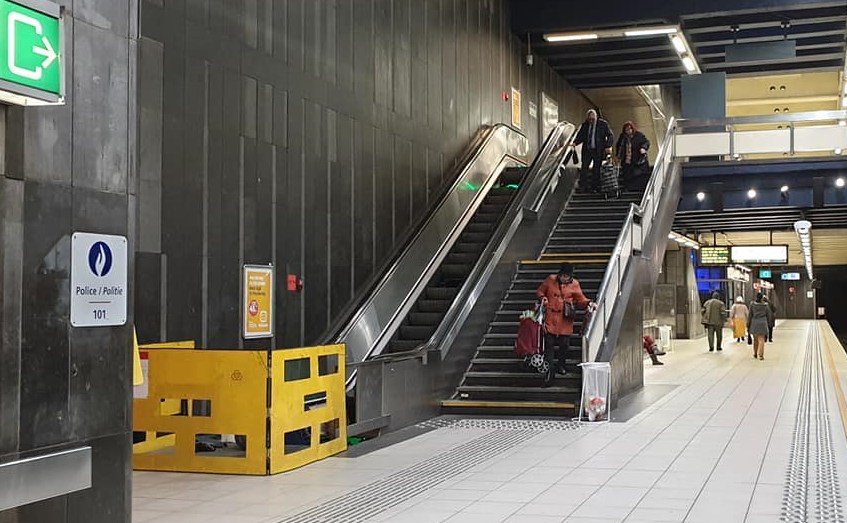The escalators in the Brussels metro stations stand still, on average, about 280 times a day, and the elevators break down so often that STIB has decided to show which ones are functioning in an app, but why is it that they cannot be permanently fixed?
There are 578 escalators in the 69 Brussels metro stations. The majority of these are at least 30 years old, meaning that first and foremost age is a prevalent reason for the frequent stoppages.
Aside from ageing machinery, however, one of the main causes of the escalator defects is "non-civil" behaviour, such as the deliberate overuse of the emergency stop button. People also use them to transport objects that are far too heavy, causing the stairs to break, or weakening important parts of the escalator.
Instances such as this make up about 220 of the 280 times that the escalators stop moving, according to STIB's figures.
"Brussels Mobility is the owner of the metro and premetro stations, meaning that everything that has to be replaced is their responsibility," An Van Hamme, spokesperson for STIB, told The Brussels Times. "The Region has a plan to replace the elevators and escalators, but we cannot control that," she added.
However, with STIB being responsible for repair and maintenance, and Brussels Mobility being responsible for replacements, making sure an elevator or escalator stays fixed can get tricky.
"The escalators and elevators in the station were placed by Brussels Mobility, but the maintenance and repair fall to STIB. However, when they are very old and worn, Mobility has to replace them," Inge Paemen, spokesperson for Brussels Mobility told The Brussels Times.
Related News
- Escalators in Brussels metro stations stand still 280 times per day
- Broken elevators in Brussels metro stations will now be shown on app
"We have a programme to make the metro stations accessible over the next few years," Paemen said. "Of course, we have to take into account the metro stations that are being renovated. We have had a plan for the Bourse/Beurs and De Brouckère stations that, which were not accessible by elevators or escalators, for quite some time, but we waited to execute it because we knew there were plans for the redevelopment of the zone," she added.
While there are already plans to improve accessibility in metro stations across the circuit, ultimately it is the timing of wider renovation plans that dictate when they will happen.
"We have had a plan for the Bourse/Beurs and De Brouckère stations that, which were not accessible by elevators or escalators, for quite some time, but we waited to execute it because we knew there were plans for the redevelopment of the zone," Paemen added.
Ultimately, however, Brussels Mobility said that the budget does not exist to replace everything that's broken in a timely fashion.
"At the moment we do not have the financial means or personnel to repair all the broken escalators and elevators in just one year, so we have to spread everything out a bit," she added.
By the end of 2020, the metro stations Vandervelde, Clemenceau and Madou will each have two new elevators, and Hallepoort station will have four new elevators by March 2021. The Park station will one new functioning elevator in 2021, and three more by the end of 2022.
"The metro system is old, and we are in a phase of renovations, after which everything will be systematically maintained. But now, we are in the phase where everything is kind of breaking down at the same time, because everything has also been built around the same time," Paemen added.
Works on the elevator shafts at the Roodebeek, Anneessens and Simonis stations have all been planned, and the elevators will be in service between 2021 and 2023. Additionally, the building permit was applied for but not yet obtained for the Jacques Brel, Horta and Arts-Loi/Kunst-Wet stations.
Maïthé Chini
The Brussels Times

